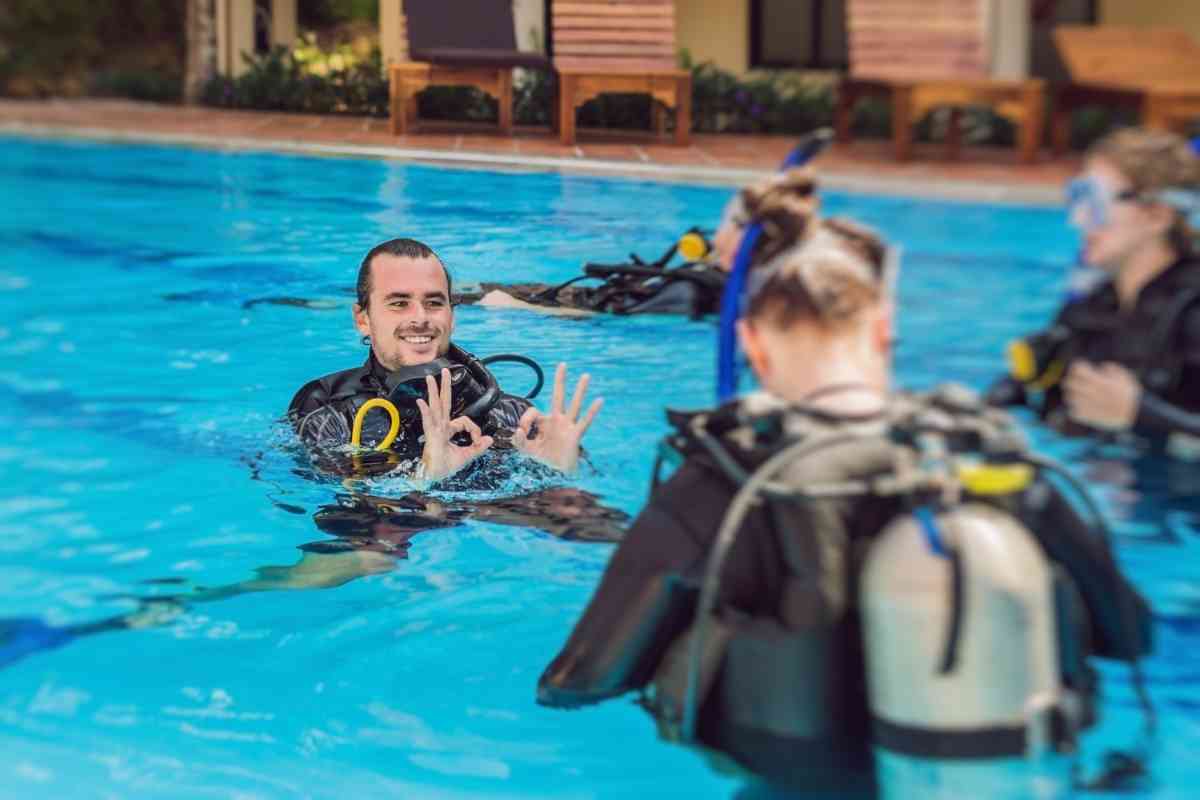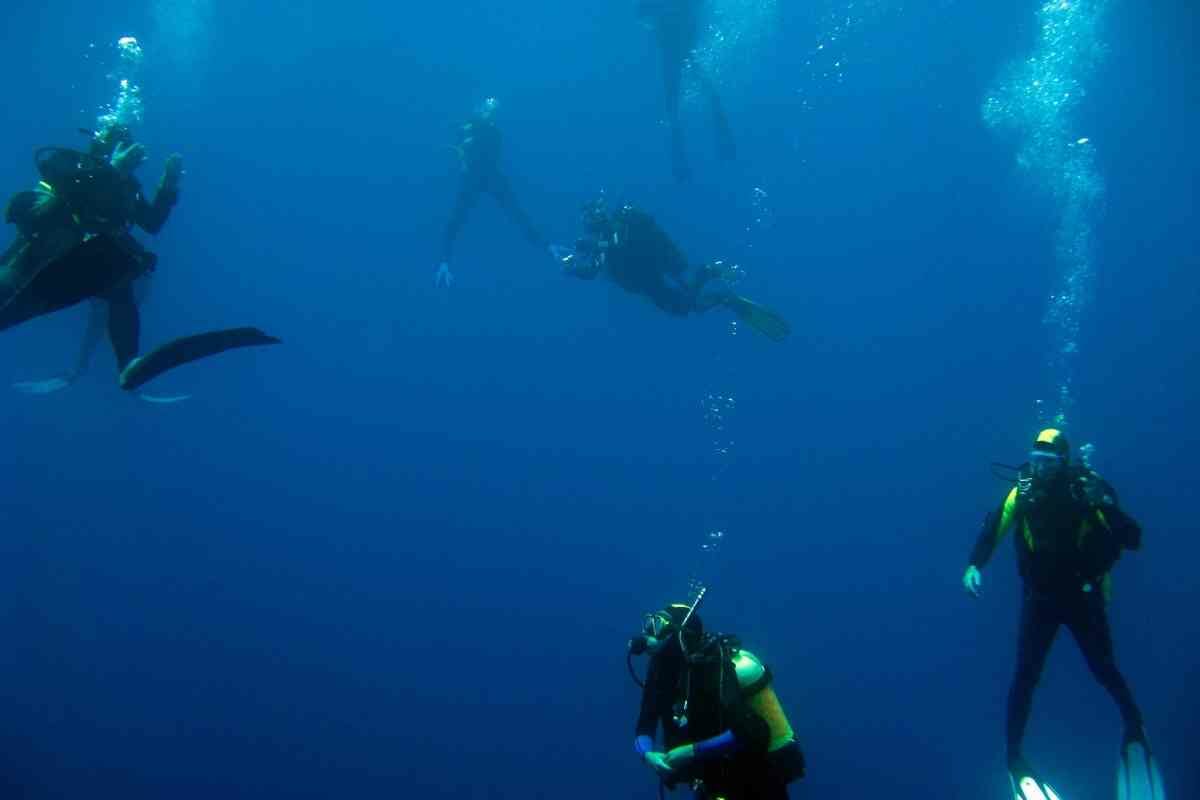Nature has provided us with several ways to have fun and ease our minds from stress. The great outdoors is a terrific source of engagement and entertainment, and there are many natural wonders across the globe worth exploring.
Bodies of water have always held a special place in our imagination. From small lakes to larger bodies of water like the sea, many people enjoy exploring the watery depths, which is possible thanks to scuba gear.
Scuba diving is a popular form of recreation–it allows us to explore the wonderful world below sea level. However, you need the proper guidance of a scuba diving instructor before you can go exploring the sea in scuba gear on your own.
What is a scuba diving instructor? Let’s take a look at what it takes to become a scuba diving instructor.

What Is A Scuba Diving Instructor?
Before we talk about being a scuba diving instructor, let’s briefly introduce what scuba diving is about.
Scuba diving simply means going underwater. What makes it stand out is the means employed to achieve this feat: the scuba gear. What is scuba gear? SCUBA is an acronym that refers to an apparatus that allows one to breathe underwater.
SCUBA stands for Self-Contained Underwater Breathing Apparatus.
Scuba gear consists of a tank filled primarily with oxygen. In addition to oxygen, the tank holds a combination of other gasses that exist naturally in our atmosphere, such as nitrogen.
When we say scuba diving, it can be simplified to mean exploring the depths of the sea or other large water bodies with the aid of scuba gear.
Now that we’ve cleared up what scuba diving is about, we can now talk about what a scuba diving instructor is.
You might be wondering what makes diving so difficult–why does it require an instructor?
You’ll be surprised to learn that scuba diving is not as easy as you think, and trying it without proper training or guidance can result in fatal injuries.
A Scuba Diving Instructor
A scuba diving instructor refers to trained personnel who have received the qualifications necessary to train and supervise aspiring divers and instructors. The job of a scuba diver instructor is also responsible for the lives of those under their care.
You can’t just wake up one morning and decide to open a scuba diving class. There are tests, instructor training sessions, and certificates that you must first attain and go through before becoming licensed as a bona fide scuba diving instructor.
This post will cover all you need to know about becoming a scuba diving instructor, and what steps you can take to get there.
How To Become A Scuba Diving Instructor
Suppose you’ve dreamed of exploring the vast worlds underwater and wanted to share your love of the watery depths with other people. With the proper training, you can achieve your dream of becoming a diving instructor and even push further to more advanced positions in the diving world.
Becoming a diving instructor is no easy task, and it can’t be achieved overnight. It requires a lot of dedication, commitment, and passion, and will push you to your limit both physically and mentally.
However, if you can work through the training and finally achieve your certification, you can be confident that you will have a great time and also make good money while you’re at it.
Suppose you don’t have any experience with diving. In that case, the journey to becoming a dive instructor will take longer because you’ll need basic practice before training to become a divemaster. However, if you’re not new to the gig and have some experience with diving, you have an advantage and might not need to go through the lengthy process.
If you don’t have a passion for scuba diving and can’t commit to the work ethic, it is better not to start this journey and you should maybe settle for another, more convenient job.
If you’re still reading to this point, then we want to believe that you mean business. So let’s start from the bottom.
You Must Be 18 Years Old or Older
Nobody will entrust their life to an underage kid for evident and legal reasons. It is good to have a passion and vision for your future ahead of time, but if you’re not up to 18 years old, please don’t try to register as a dive instructor.
You will need a bona fide means of identification to verify your age and other relevant information about you.
Divemaster Certification
If you already have experience in diving, you might already know what a divemaster is. However, for the sake of newcomers, let’s talk about the legendary divemaster.
A divemaster is a diving professional who assists diving instructors. So yes, becoming a divemaster is a step up the ladder, and it also comes with a certain amount of training and experience.
Before you can become a divemaster, there are some criteria that you have to meet. You can see now that becoming a dive instructor is not just something you do because you think it’s fun. If you’re not properly motivated, you might start getting tired before reaching there.
Let’s look at some of the criteria you need to meet to become a divemaster:
Advanced Open Water Diver course
The Advanced Open Water Diver is one of the courses you must take to become a divemaster. Of course, it is not free, and you will need to pay a fee. Notably, like all educational systems, it costs money to complete the required courses to become a diving instructor.
The Advanced Open Water Diver course is a basic course aimed at improving your performance in the water. In this course you will improve your buoyancy, learn to navigate in open water, and practice deep diving. You’ll also perform three specialty dives of your choice.
Overall, the course gives more experience diving in open water and below 60ft. You also get to try different types of diving.

Rescue Diver Course
This course will boost your confidence as a diver, give you more experience dealing with the gear, teach you how to act during an emergency, and improve your navigation skills. You will learn basic aid, which will come in handy when diving and make you a better diving companion. Learning this course will also cost you another fee.
This course will make you a more reliable diving buddy and increase your diving experience.
Emergency First Response Training, Primary And Secondary Care
For this course, it is crucial to note that you must take this course within a year or two of when you want to register as a divemaster. If you took it longer than two years before, you will need to undergo a refresher course.
This course is all about reacting in times of extreme emergency and when life is at stake. The course teaches you how to administer CPR, give first aid, and deal with various possible injuries, broken bones and dislocations. You will learn essential maneuvers to keep people alive before proper medical attention arrives.
Don’t forget that this course is also not for free, and you will need to make a separate payment for it.
Just these three courses alone may cost you up to $500, so you can see you need to be committed or might get discouraged. These courses are not all you need to be considered a divemaster. Let’s look at the others.
Medical Clearance to Dive
Unfortunately, not everybody that has the passion for being a dive instructor can do it. Some medical conditions prevent people from staying underwater for too long or reaching a certain depth.
Medical clearance is required because of people suffering from these medical conditions. Medical clearance must be certified by a doctor to confirm that you are fit to dive and don’t have any medical condition that endangers your life if you get into the water.
100 or More Logged Dives
To become a divemaster you must have completed a minimum of 100 logged dives. Let us break it down for you.
Before you can be considered a divemaster, you must have a good deal of experience with diving. A significant number of dives must be logged before you take any official courses. This is because the three courses we mentioned all include diving at some point, and somebody that can’t swim isn’t expected to take part in the course.
Specifically, you must record at least 40 dives before taking the course. Also, when you’re taking the courses, you should log at least 60 dives, which is the standard number. So by the time you’re rounding up the divemaster course, you’ll have had at least 100 logged dives.
The Instructor Examination (IE)
The Instructor Examination (IE) is the final hurdle to becoming a certified dive instructor. This test may be quite daunting for aspiring divers.
You don’t wake up and decide you want to take the IE–you have to take the time and effort to prepare for it. There are different ways you can qualify for the IE, and becoming a divemaster is a good start.
Along with being recognized as a divemaster, you must receive diver certification. To this end, you must be certified for at least six months, after which you become eligible to participate in the Instructor Development Course. You will need to take the Instructor Development Course before taking the IE.
Another way to qualify for the IE is by directly taking part in the Instructor Development Course (IDC), which is split into two parts.
The first part is called the Assistant Instructor Course, in which you will be trained to be an assistant instructor. At the end of the AI course, you will be recognized as a certified AI, and you can go on to the second part of the course.
The second part of the course is the Open Water Scuba Instructor (OWSI) Course. The course involves practical tests, allowing you to show off the technical skills you’ve learned thus far. After completing the OWSI, you will then be eligible to take part in the IE to become a certified dive instructor.
People who already have experience diving and are recognized as instructors with other organizations can join the OWSI and take the IE directly.
Now that you know what it takes to become a dive instructor, we want to look at some common questions that you should know the answers to before you embark on this journey.
Can You Make A Living As A Dive Instructor?
The straight answer to this question is yes, you can make a living as a dive instructor. However, the amount of money you make will depend on your level of experience and the type of opportunities that present themselves.
On average, an Open Water Dive Instructor makes a base income of $20K a year (new instructors). The more qualifications you acquire, the more potential you have for earning more and working with well-recognized SCUBA agencies.
Also, you can organize classes, dive shops, and open a diving venture for tourists.
Which Diving Certification Is Best?
So far, the PADI is still considered the best in the diving industry, and many people with other certificates come to participate in the Professional Association of Diving Instructors.
How Long Does It Take To Become A Dive Instructor?
There is no set time for becoming a dive instructor. It could take months or it could take years. However, some people disagree about how much training is necessary before granting certification.
If you have enough resources (time included), you can finish the entire course in six months. But given that you will be in charge of people’s lives, we recommend that you give yourself more time to train and become an expert.
What Is a PADI Instructor?
A PADI instructor is someone who has received certification from PADI. The Professional Association of Dive Instructors is a professional body that educates and trains eligible personnel for dive instruction.
Conclusion
Being a scuba diving instructor is fun. Not only do you get to explore life underwater, you also get to teach others and share the beauty of the aquatic world with them.
For those who were wondering what a scuba diving instructor is, you now know what one is and what it takes to become one. You can learn more about scuba and scuba-related subjects here.
